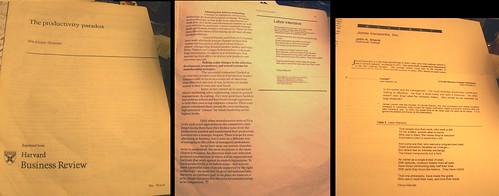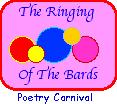Posthumous Appreciation: John K. Shank

Large view
You never know where a poem will end up....
Every so often I Google myself. What turns up is a hodgepodge of magazine indices, running race results, transcription acknowledgements, blog material, personal profiles, and whatnot.
On Thursday I learned that a poem of mine had been used in a business school case, in what I think is a very cool way. I was delighted for a number of reasons, but I immediately searched for the author's contact info because he hadn't included bibliographic information about where the poem was first published. Properly, that should be included.
The case is Professor John K. Shank's "Jones Ironworks, Inc.". My poem, "Labor Intensive," appears at the end. My name is there as the author (hence the Google find), but the sonnet first appeared in the Harvard Business Review's July-August 1986 issue, No. 86414. "Labor Intensive" follows Professor Wickham Skinner's article, "The productivity paradox."
Shank adapted his case from one written by Professor Felix Kollaritsch of the Ohio State University, but I couldn't find out from a Web search if Kollaritsch had also used the poem.
I also wrote to Shank that having my poem appear in a case creates an educational full circle. It was inspired by a presentation given at the Harvard Business School, where I was then employed. The poem's genesis, however, lay in the stories told by Professor Lee A. Borah, Jr., now retired from Wagner College, where I received my BA in Psychology. Dr. Borah and I still keep in touch. His Industrial Psychology course exposed me to my first case study. I subsequently acquired an MS in Applied Psychology from Stevens Institute of Technology, with a concentration in Human Factors.
The inspiration for "Labor Intensive" also produced "Cog." I'd sent that story first to Tales of the Unanticipated, a magazine of the Minnesota Science Fiction Society, in honor of Dr. Borah's education at the University of Minnesota. "Cog" appeared in TOTU's Fall/Winter 1988 issue.
Almost three-quarters of my e-mail to Shank was my response to his case, because it sparked my own critical analysis muscles.
A search for "Jones Ironworks" shows the case has been taught at the Asian Institute of Technology School of Management, the University of Alabama, Johns Hopkins University, Marshall University in West Virginia, Sukhothai Thammathirat Open University in Thailand, the University of Texas at Austin's McCombs School of Business, the University of Texas at Dallas, the University of Toronto's Rotman School of Management, and the University of Washington Business School -- in addition to the Tuck School of Business at Dartmouth College, where Shank had taught. The case is also part of Professor Shank's book, Cases in Cost Management: A Strategic Emphasis, published through South-Western College Publishing and available through numerous outlets.
I sent my e-mail off to Shank. It bounced back. I did another search -- and learned that Professor Shank died on March 30, 2006.
Wrote Tuck School Dean, Paul Damos:
Professor Shank touched the lives of thousands of students, faculty members and business leaders over the course of his academic career at Harvard, Tuck, Ohio State, Babson, and the Naval Post Graduate School....Many graduates over his twenty year career at Tuck will remember his incredible presence in the classroom and his amazing intellect. He published 16 books and wrote more than 100 articles for leading journals in accounting, finance and management. Far from complete retirement, John was still writing and teaching, and he had just joined the Board of Directors of Lazard, Ltd....John was a core member of the Tuck family, a mentor and friend to
many, and a passionate soul who had an impact on all that he met." (Tuck2000 Blog)
I wish I'd known about the case when he was still alive, so that I could have thanked him then. I've mailed a printout of my e-mail and condolences to the Tuck School.











0 Comments:
Post a Comment
<< Home